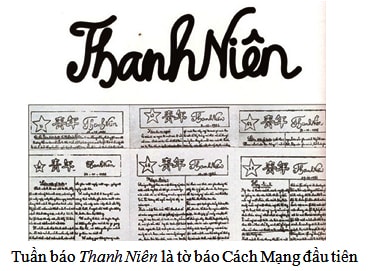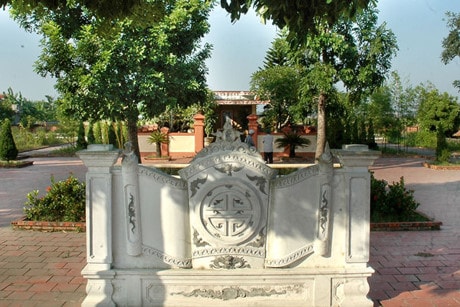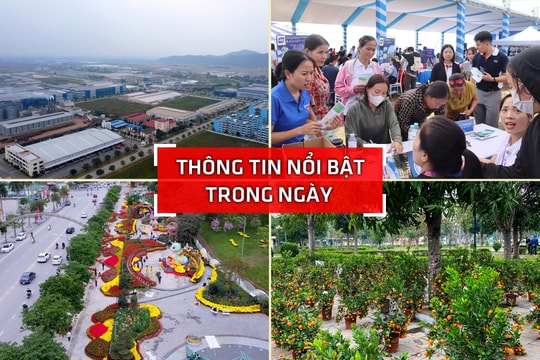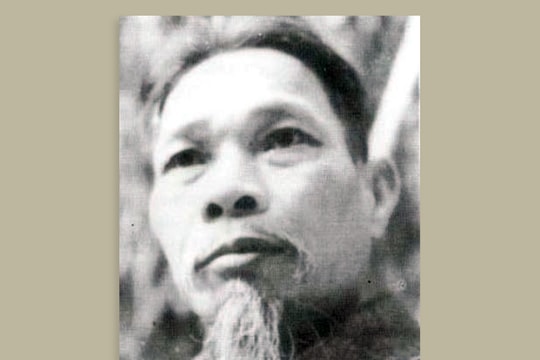Ho Tung Mau - Famous revolutionary predecessor
(Baonghean.vn) - The name of Mr. Ho Tung Mau is associated with Tam Tam Xa, the predecessor organization of the Vietnam Revolutionary Youth Association. He was also one of the 7 people who attended the Party's founding conference on February 3, 1930 in Hong Kong, chaired by Uncle Ho.
People who do… "word of mouth"
Ho Tung Mau was born into a family with a long tradition of imperial examinations and patriotism in Quynh Doi commune, Quynh Luu district, Nghe An, alongside other famous families such as Phan Dinh Phung's family in Tung Anh, Duc Tho; Dinh Van Chat's family in Nghi Long, Nghi Loc...
The ancestor of Ho Tung Mau was Ho Trong Dien, who passed the Huong Cong exam in the Le Dynasty and became an official in the Nguyen Dynasty, holding the position of Nghe An Education Inspector, then was transferred because he opposed the selfish actions of the provincial governor. When he returned to his hometown, he opened a school and had 600 students, including many great scholars (1).
Ho Tung Mau's great-grandfather was Ho Trong Tuan (also known as Ho Trong Toan) - the third son of the Inspector Ho Trong Dien. Ho Trong Tuan married Pham Thi Khanh - the eldest daughter of the Inspector Pham Dinh Trong, the older sister of the famous scholar Pham Dinh Toai - a famous scholar of Vietnamese culture. Ho Trong Tuan passed two Baccalaureate exams, and in 1828 he passed the Bachelor's degree. Shortly after that, he was appointed as the District Chief of Hoai Yen, promoted to Trieu Phong District Chief, then the Judge of Quang Yen, Hung Yen and Thai Nguyen provinces. He was famous for being an honest and virtuous mandarin. He donated most of the land he was granted to his relatives and neighbors. After retiring, he contributed to the people's repair of dykes to prevent salt water, built sluices to drain water, and established a charity fund to lend to people during crop failures and famine.
 |
| Ho Tung Mau was an active writer for Thanh Nien newspaper at that time. |
In his thorny revolutionary life, Ho Tung Mau left many deep impressions. First of all, in May 1925, Nguyen Ai Quoc sent Ho Tung Mau to Hangzhou to meet Phan Boi Chau, but he went to Shanghai and fell into the hands of French secret agents. They had a secret plot to kill Phan.
Knowing that bad news, Ho Tung Mau and Ho Diec Lan (son of Ho Hoc Lam) wrote many articles published in Chinese newspapers at that time under the pen name Ho Mong Tong denouncing the French colonialists' evil plots and actions against the great Vietnamese patriot. Those articles were truly the "starting shots" that sparked a wave of demands to release Phan and stop their dark plots, forcing them to bring Phan back to Hanoi for trial.
The second event was on June 6, 1931, when Tong Van So - Nguyen Ai Quoc was arrested by the British colonialists in Hong Kong. Upon hearing the news, Ho Tung Mau and Truong Van Linh sought to contact the Communist International delegation to intervene and asked lawyer Lo-giơ-bai to help defend him.
In the case of Tong Van So, he was acquitted and expelled from Hong Kong, but Nguyen Ai Quoc escaped without falling into their trap. But also in 1931, unfortunately, Ho Tung Mau also fell into the hands of French secret agents, so they immediately brought him back to the country for trial. At the trial on December 6, 1931 in Vinh, they intended to immediately carry out the death sentence in absentia as previously announced at the end of 1929.
With sharp arguments, Ho Tung Mau strongly protested that unjust verdict, finally forcing them to sentence him to "life imprisonment". From here, his 14 years of prison life went through Hoa Lo prison - Hanoi, Vinh prison, Lao Bao, Con Tum, Buon Ma Thuot, Tra Khe with all kinds of brutal tortures. In the imperial prison, Ho Tung Mau turned the prison into a revolutionary school, nurturing his fighting spirit by proposing to establish "Tao dan prison", working as an "oral newspaper", composing poetry and literature such as the "oral publication" novel called Red Blood Drop...
In March 1945, taking advantage of the opportunity when Japan ousted the French, he and many fellow prisoners escaped from Tra Khe prison and returned. After returning to Quynh village to meet his wife, children, and neighbors for only a few days, he was invited to the district office by Quynh Luu district chief Chu Ngoc Lien and personally handed a letter from Tran Dinh Nam (Minister in Tran Trong Kim's cabinet) inviting him to Hue to be an advisor, but he tactfully declined.
"Loyal to the country, filial to the people..."
On March 19, 1948, Ho Tung Mau's only son, Ho My Xuyen, who was the Deputy Secretary of Nghe An Provincial Party Committee and participated in the Government's special delegation to inspect the provinces, died on a business trip to Luc Yen district, Yen Bai province. Ho My Xuyen passed away, leaving behind three young children: 8-year-old Ho Anh Dung (former General Director of Vietnam Radio and Television), 4-year-old Ho Ngoc Hai (former Deputy Head of the National Committee for Social Sciences and Humanities), and newborn Ho Duc Viet (currently a member of the Politburo and Head of the Central Party Organization Committee). Upon hearing of Ho My Xuyen's death, President Ho Chi Minh personally typed a letter of condolence to Ho Tung Mau's family.
On December 18, 1949, President Ho signed a decree to establish the Government Inspectorate and appointed Ho Tung Mau to hold the position of Inspector General. From here, he had the opportunity to work alongside the beloved leader of the Party and the nation, helping him build and consolidate the revolutionary government nationwide in the positions of Inspector General of the Government, President of the Vietnam-China Friendship Association (from early 1950), and alternate member of the Party Central Committee (from February 1951).
 |
| Tomb of Ho Tung Mau in Quynh Doi commune (Quynh Luu). |
On July 23, 1951, Ho Tung Mau sacrificed his life in Cong town, Tinh Gia district, Thanh Hoa province, leaving behind endless grief for many relatives, friends, and comrades. The Provincial Party Committee and People's Committee of Thanh Hoa and Nghe An provinces brought his body back to his hometown for burial. The Government delegation from Viet Bac brought the eulogy back to hold the memorial service on a night in August 1951. Meanwhile, in Viet Bac, the memorial service for comrade Ho Tung Mau was held at the Government Council Hall in Thac Dang, with President Ho as the head of the committee, attended by comrades Pham Van Dong, Phan My, Bui Cong Trung... President Ho read the eulogy but could not hold back his tears:
“Uncle Tung Mau! My heart aches, does your soul know? In terms of personal feelings, you and I are comrades, closer than real brothers. When working in a foreign land, when imprisoned in an imperialist prison, when fighting in our country... we have shared many hardships together like hands and feet... Losing you, the people lost a dedicated leader, the Government lost a veteran cadre, the organization lost a loyal comrade, and I lost a close brother. Many sources of grief come together in my heart... I wipe away my tears, on behalf of the Government, bow before your soul and posthumously award you the Ho Chi Minh Medal to honor your contributions to the people, to the Fatherland... I promise you, all colleagues and comrades will try to follow your example of revolutionary morality, follow your example of loyalty to the country, and filial piety to the people...”.
The eulogy highly appreciated Ho Tung Mau's contributions to the Vietnamese revolution, and also expressed President Ho's deep affection for this outstanding revolutionary.
Peace(Synthetic)



